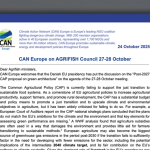PRESS RELEASE
New major IPCC report advises to take prompt climate action to save our people and planet
Brussels, 9 August 2021 – Prompt climate action needs to be taken according to the new major scientific report by the Intergovernmental Panel on Climate Change (IPCC) which concludes that temperature is rising faster than expected towards catastrophic rates and we are approaching the 1.5°C increase limit that would come with significantly lower harm for our people and planet than surpassing it.
This new IPCC report paints an even bleaker picture of a planet at risk of seeing dramatic changes in its fundamental parameters which have made human civilisations possible, if emissions from fossil fuels and other sources are not immediately contained. On the other hand it also makes clear that much of the future climate is still in the hands of today’s generations, as “stringent emission reductions have immediate and sustained effects on human-caused climate change”, the report states.
“Arriving at a time when we are witnessing devastating forest fires and floods in Europe, this report must be followed by adequate action which is currently still missing. We call on the EU to step up its efforts for accelerating the transformation towards a climate-neutral continent, as current plans are insufficient to keep the 1.5°C limit agreed in the Paris Agreement within reach by 2030. This report adds further weight to the need for European lawmakers to make the ‘Fit for 55’ climate and legislative package into a set of policies and measures that fit for 1.5°C,” said Wendel Trio, CAN Europe Director.
“We are witnessing the devastating consequences of climate change in Europe this summer. While it is crucial to focus on protecting and supporting those impacted or under threat by extreme weather events, governments must do whatever they can to prevent these from happening. It is clear they are currently failing and more must be done to avoid going beyond the 1.5°C limit enshrined in the Paris Agreement to prevent more and worse threats to the health, lives and homes of millions of people,” said Sven Harmeling, CAN Europe International Climate Policy Coordinator.
CAN Europe calls each European country to face the crisis at the scale it requires, namely by rapidly declining and phasing out the use of fossil fuels through a 100% renewable energy future, shifting to sustainable agriculture, and preparing the people in Europe for those impacts of the climate crisis can no longer be avoided.
“Vulnerable developing countries are facing and will face particularly severe consequences from climate change given their geographies and lack of resources. Aside from stepping up the ambition of its climate and energy legislation, the EU should use revenues from its Emissions Trading System, energy taxation and the planned Carbon Border Adjustment Mechanism to support lower income people and vulnerable communities: both through the transition in Europe, and for adaptation and to address losses and damages in developing countries,” said Rachel Simon, CAN Europe Climate and Development Policy Coordinator.
Note for editors:
This report is the first part of the IPCC’s 6th Assessment Report and comes 7 years after its last major assessment on the state of science on climate change. The key scientific findings distilled are the guiding compass for policymakers to take action and inform the UNFCCC process. For the first time the IPCC approved one of its reports in a virtual setting, in an overall disrupted timeline due to COVID-19. Two other major reports forming part of the 6th Assessment shifted into 2022 (one on impacts, adaptation and vulnerability, and another one on mitigation.)
–ENDS–
CONTACTS:
Nina Tramullas, Communications Coordinator. nina@caneurope.org
Sven Harmeling, International Climate Policy Coordinator. sven@caneurope.org
Link to CAN International’s press release



